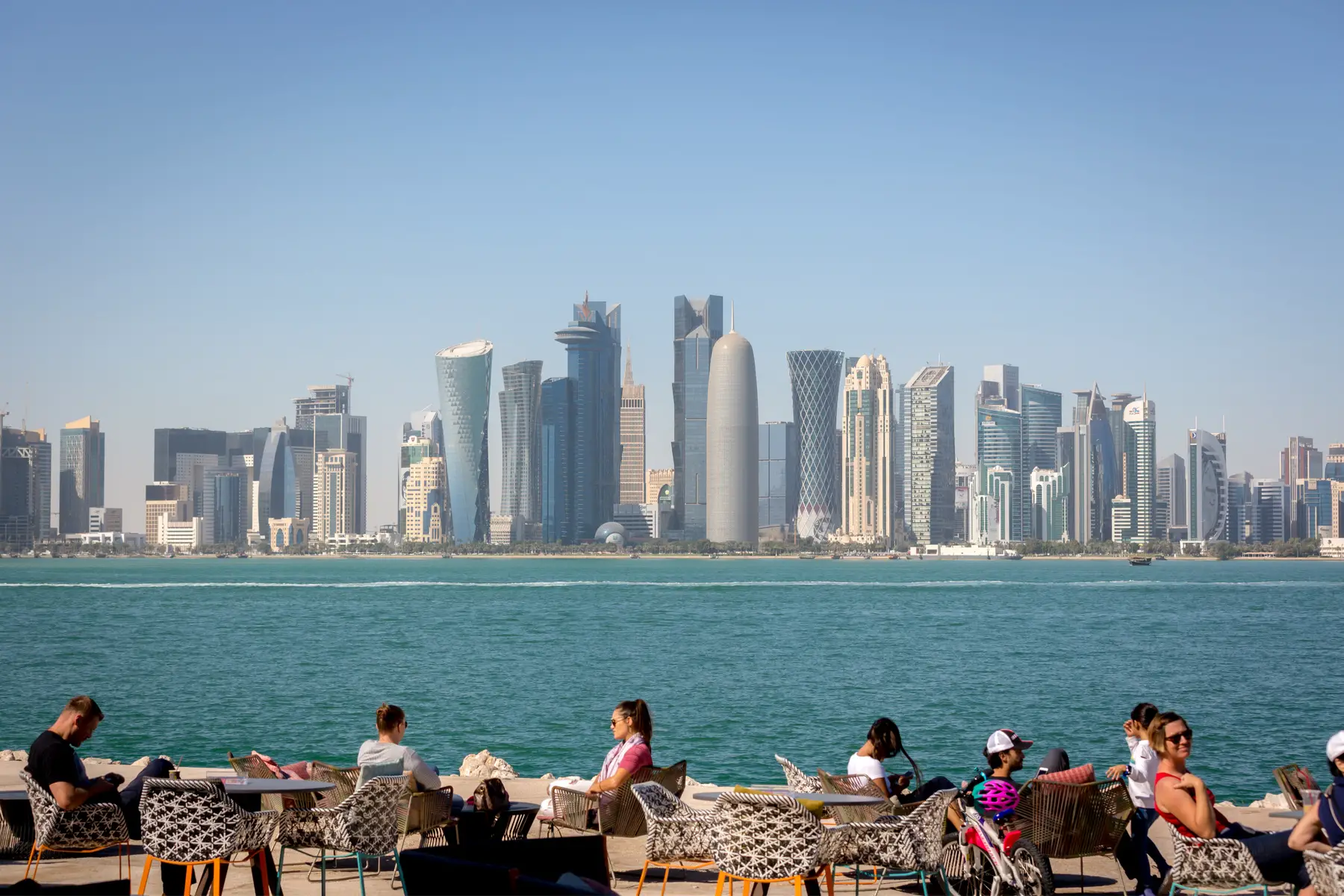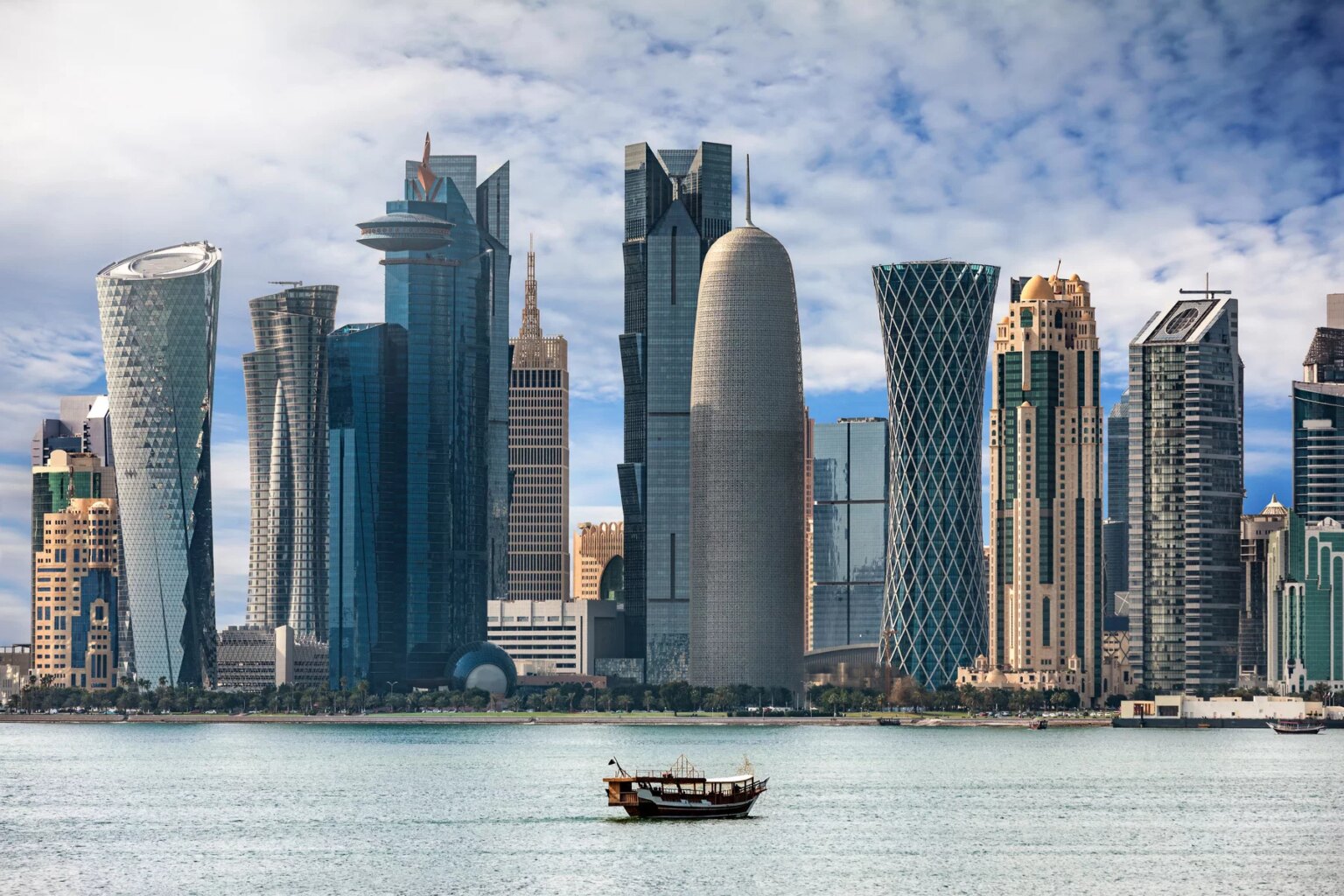In Qatar, expat life sits at the intersection of tradition and modernity. Conservative values underpin everyday life in this small, high-income, country. Qatar’s rapid development is fueled by oil and gas exports. As a result, some two million internationals live and work in Qatar, comprising 95% of its total workforce. Residents benefit from good healthcare, education, and salaries. But, as with anywhere in the world, there are some challenges to living in Qatar as an expat.
To answer key questions about the Qatar expat experience, the topics covered below include:
- What’s it really like to live in Qatar?
- Can I afford life in Qatar as an expat?
- What’s it like to work in Qatar?
- Is it easy to find love in Qatar?
- Can expats in Qatar afford a home?
- What’s it like being a woman in Qatar?
- What’s life like for young people and families in Qatar?
- What’s the healthcare situation for expats in Qatar?
- So what’s the worst thing about living in Qatar?
- Tell me the best thing about the Qatar expat experience!
Sirelo
It’s no secret that moving abroad can be stressful. Sirelo’s team of removal advisers is here to help. They provide five free quotes from international shipping companies so you can find the best options at the best prices. Take the stress out of your relocation to Qatar with Sirelo.
What’s it really like to live in Qatar?
Qatar is among the top ten places for expats to live and work. That’s according to HSBC’s Expat Explorer 2021 survey that polled more than 20,000 expats in 46 countries and territories. Qatar ranks highly for livability, aspiration, and future outlook. About 80% of the respondents reported improved quality of life since moving to Qatar.

Nevertheless, expats may find themselves having to get to grips with a culture significantly different from their own.
On the one hand, Qatar is a modern nation with a wide variety of entertainment and nightlife options. Supercars, luxury hotels, and high-octane shopping experiences are common. If you are on a high expat salary package, these experiences are not hard to find. However, it remains a conservative Islamic society and the country’s legal system is heavily influenced by the tenets of Sharia (Islamic) law. Residents are expected to abide by social conventions around modesty that may take some getting used to. Politically, Qatar is a constitutional monarchy, but the ruler (the Emir) possesses executive power to approve or reject legislation.
Apart from religion and tradition, the country’s abundance of oil and gas wealth informs every aspect of life in Qatar.
Can I afford life in Qatar as an expat?
Qatar is one of the more expensive parts of the Middle East, but it remains less expensive than other Gulf countries. The global 2021 Mercer Cost of Living Index ranked Doha at 130 out of 209 cities, cheaper than neighbors Dubai, Riyadh, and Kuwait City. For perspective, New York City is the 14th most expensive city on the Mercer index, while Berlin ranks 60th.
According to the crowd-sourcing site Numbeo, a family of four should expect to spend QR11,397 on monthly expenses, without rent. For a single person, that works out to QR3,222. Users of the platform report that Doha’s rents have increased and are perceived to be the most expensive in the Middle East.
What’s it like to work in Qatar?
The high percentage of expats means that Qatari workplaces are extremely international. While Arabic is the country’s official language, English is the lingua franca. But informal conversations may often be conducted in Malayalam, Hindi, French, or Tagalog.
There is no single business culture in Qatar, and as an expat, you will need to be flexible and open-minded. While handshakes are the normal greeting at meetings, Qatari will most likely not shake hands with the opposite sex.

Workweeks vary between 40 and 48 hours, with up to eight hours per day. In Ramadan, this drops to 36 hours per week or six hours per day. Friday is the weekly rest day, though most international companies also have Saturdays off.
Government offices tend to open from 06:00 to 14:00, and private companies normally operate from 08:00 to 18:00.
With hydrocarbon industries accounting for over 50% of GDP in Qatar, expats often find work in the petroleum and chemicals sectors. The majority of expats in Qatar either find a job through international recruitment agencies or as an internal transfer.
Getting a work visa in Qatar
An expat looking to live and work in Qatar will need a Work Residence Permit (commonly referred to as an RP). Obtaining a work permit is your employer’s responsibility.
The Ministry of Interior issues work and residence permits. Your employer, usually a Qatar-registered company or a Qatari national, must renew the permit each year.
When you first enter Qatar, your employer will arrange for a temporary visa. It will be converted to an RP in about four weeks. You won’t be able to leave the country until your RP has been issued.
In recent years, the government has slowly begun to introduce labor reforms. Besides introducing a minimum wage, the Gulf state has now amended its sponsorship (kafala in Arabic) rules. The system previously prevented workers from changing jobs without their employers’ permission.
Salaries and taxes in Qatar
Average salary estimates for Qatar vary considerably. Local media put the average monthly wage at QR20,326 in 2020 and the most typical salary at QR13,916.
In 2014, the average Qatari household income was QR72,700 per month. Qatari households are generally larger than expat households. Having said that, it still amounts to nearly three times the average expat household monthly income of QR24,400.
As of 2021, Qatar’s minimum wage for all workers is QR1,000 a month. There are also mandatory additional allowances of QR300 and QR500, for food and housing respectively.

Employment contracts are typically accompanied by a six-month probation period. You get three weeks of paid annual leave for the first year of working for an employer. That becomes four weeks after five years at the same employer.
As an expat, you are not eligible for a state pension and you have to make your own provisions in this regard. However, expat employees begin to build up end-of-service gratuity payments after the first year on the job.
Qatar has long been considered a tax-free country. This is because residents do not pay income tax and there are also no property taxes. However, a value-added tax of 5% is expected to be introduced in 2022.
Is it easy to find love in Qatar?
With large numbers of single expats, there are plenty of fish in Qatar’s romantic waters. The temporary, “I’m just here for two years” mentality could preclude long-term relationships. However, plenty of foreigners literally meet their match on the peninsula.
The road to romance can run through dating apps such as Tinder, OKCupid, and LoveHabibi, which offer the same challenges as anywhere else. Many expats have more luck finding partners among their circle of friends, at bars, clubs, or even at work. Either way, expats need to be aware of prohibitions around dating in Qatar and premarital sex. In practice, authorities are relatively tolerant and expats won’t generally land in trouble if they remain discreet.
Getting married as an expat in Qatar
Expats who want to tie the knot in Qatar should first check with their country’s embassy for local advice. Some embassies conduct wedding ceremonies, including India, the Philippines, and the UK.
In general, your nationality, religion, and choice of partner determine the kind of wedding ceremony you have in Qatar. As of 2009, all couples marrying in Qatar must take mandatory premarital genetic tests to determine potential health risks.
Specific rules govern marriages between Qataris and non-nationals. Consult Qatar’s e-government website for more information.
Muslims can marry at the Family Court (formerly the Sharia Court) or arrange for an official to conduct the ceremony at a private venue. You will need two witnesses in either case. Muslim brides must be accompanied by a male family member, typically your father or brother.
Civil marriage is not available to non-Muslims, however, some religious ceremonies are recognized. Christians, whether Catholic or Anglican, may marry in church after suitable preparation. You will need to register the wedding at the Ministry of Justice. Take along the wedding certificate and an Arabic translation. The registration then needs to be attested by the Ministry of Foreign Affairs.
It is advisable to have your wedding attested and registered by your country’s embassy.
Same-sex weddings are not permitted in Qatar.
It is possible to get a divorce in Qatar, although the procedure is both difficult and uncommon.
Can expats in Qatar afford a home?
Expats have been allowed to buy both freehold and leasehold properties in Qatar for more than a decade.
Buying real estate in Qatar may be accompanied by residency visas. The government grants residency to owners of property worth at least QR730,000 as well as their families. Those with properties worth QAR3.65 million will receive permanent residency, including health and education benefits.

While home prices all over the world have skyrocketed in the wake of COVID-19, they have remained sluggish in Qatar. Residential capital values in the last quarter of 2021 were 4% lower than in the same period the previous year. Rising market supply could offset investor demand in the run-up to the 2022 FIFA World Cup.
In mid-2021, the average value of a residential unit stood at QR7,238 per sq/m. That works out to about QAR435,000 for a studio apartment of 60 sq/m.
If you’re looking to live in Qatar long-term, the low prices could represent a buying opportunity. Mortgages in Qatar have become more easily available in recent years. However, keep in mind that expats may only borrow up to 70% of the property’s value.
What’s it like being a woman in Qatar?
Qatar is a conservative country but it has made historic strides on several fronts. Women can drive in Qatar. They can also vote, run for elections, and access education and employment at all levels of society.
At 93.5%, female literacy is almost on par with men (94.7%). Qatar allowed women the right to vote alongside men in 1999. Women make up 51% of the workforce; higher than the world average, and the highest in the Arab world. And female entrepreneurs will find few barriers to starting a business in Qatar.
Nevertheless, areas of improvement remain. In Qatar, expat women will find they do not enjoy the same freedoms as elsewhere. The World Economic Forum’s Global Gender Gap 2021 report ranks Qatar at 142 out of 156 countries. The report notes gender gaps in life expectancy and access to health. The 2020 report placed the country at 135.
In Qatari society, women have so far required male guardians’ permission to marry, travel or make decisions about their children. This appears to be changing, with women’s empowerment a key focus over the decade to 2030.
Women do not need to cover their hair or face in Qatar. However, everyone – man or woman – should dress modestly in line with local tradition.
Women’s health in Qatar
In Qatar, expat women generally have access to excellent health services. For most, the situation will likely mirror your home country. You can expect highly trained expat medical staff and state-of-the-art equipment. There are also several women-only clinics and hospitals.
Expats are typically covered by employer-issued health insurance. The extent of coverage may depend on your contract, but basic insurance should cover most women’s issues.

Life expectancy for women in Qatar is about 82 years.
Abortion is legal under specific conditions:
- It must be necessary to save the mother’s life.
- Alternatively, the fetus must be less than four months old or likely to be born with serious and incurable deformities.
- A committee of three medical specialists, including an expert in gynecology and one in obstetrics, must recommend the procedure at a government hospital.
Contraceptives can be purchased over the counter and nearly 50% of Qatari women use them regularly. However, the morning-after pill isn’t available in the country.
Giving birth in Qatar
Expat women who choose to have a baby in Qatar will benefit from high-quality clinics and hospitals. According to UN Children’s Agency (UNICEF), most women (85%) receive antenatal care and all (100%) have a skilled attendant when giving birth.
Maternity services are available at public hospitals. But many expats choose private hospitals for quicker service and a doctor from their home country. Of course, you will need to pay out of pocket or have private health insurance to access private hospital care.
Babies born in Qatar to expat parents are not entitled to Qatari citizenship.
Maternity leave in Qatar
Working women who give birth in Qatar are entitled to 50 days of paid maternity leave. At least 35 of those days must be taken after the birth. Mothers can request additional unpaid leave, but this is at their employers’ discretion. Employers may not fire an employee while she is on maternity leave.
There is no law concerning paternity leave but most companies offer new fathers three to five paid days off.
What’s life like for young people and families in Qatar?
Qatar is a family-friendly nation. From malls to restaurants, there is a wide range of children’s facilities and activities available.
Overall, children’s rights are relatively well respected in Qatar. The country ranks 39th out of 182 countries and territories on the KidsRights Index 2021. The global ranking measures respect for children’s rights, and to what extent countries are committed to improvements. However, NGO Humaniam says areas of concern in Qatar include discrimination and the fact that a child is considered criminally responsible at the age of seven.

Qatar also ranks 32nd out of 181 countries on the Global Youth Development Index. That’s ahead of the UK and the UAE but behind Singapore and the Netherlands. The index measures the progress of young people between the age of 15 and 29 by looking at key indicators:
- Education
- Employment and opportunity
- Health and well-being
- Equality and inclusion
- Political and civic participation
- Peace and security
Educating expat kids in Qatar
Students in Qatar rank below the median mark in the 2018 OECD/PISA survey of educational standards among 15-year-olds. The survey tracks reading literacy, mathematics, and science. Girls generally fare better than boys across all three metrics. There remain large inequalities between the highest and lowest-performing students.
Public schooling is free in Qatar, but available primarily in Arabic. Expats, therefore, tend to choose private schools targeted at specific international communities and often accredited by global institutions. For parents, they offer peace of mind that their children can transition more easily to schools in their home country – or continue within global systems such as the International Baccalaureate.
Keep in mind that international schools can be expensive. Expats in Qatar will find that school fees can range from QR28,000 to QR80,000.
What’s the healthcare situation for expats in Qatar?
Qatar’s healthcare system is generally well-regarded. It ranks 20th out of 83 countries on Numbeo’s crowd-sourced 2021 Health Care Index. That’s three spots below Germany (17), but above the neighboring UAE (34).
The Legatum Prosperity Index, on the other hand, ranks Qatar 39th out of 167 countries. Factors considered include longevity, preventive interventions, care systems, and behavioral risks.
Overall, healthcare standards remain high. During the recent COVID-19 pandemic, for example, Qatar achieved a vaccination rate of 83%. By October 2021, more than 1.6 million vaccines had been provided to residents.
There are approximately 2.5 doctors per 1,000 inhabitants in Qatar. Public GPs work mainly in primary health care centers and clinics, while private GPs are more likely to have their own practice. If you use public healthcare, you will need a GP referral to see a specialist. Whereas you can usually make an appointment with a private specialist without a referral.
Most doctors speak English. You can ask also for an Arabic-speaking professional if you prefer. Many doctors in Qatar are expats, so you shouldn’t have trouble finding one from your home country. You can find a doctor in Qatar through the Council for Healthcare Practitioners, your country’s embassy, or your health insurer.
Health insurance for expats in Qatar
All non-Qataris residing in or visiting the country must take out private health insurance. The law mandating insurance for expats aims to develop the health sector and ease the burden on public services.
If you’re looking for primary healthcare coverage in Qatar, check out these international insurance providers:
So what’s the worst thing about living in Qatar?
Qatar is a rich country, often ostentatiously so. Nationals and expats enjoy one of the highest living standards in the world – if they have the means to do so. Income inequalities are widely visible. According to the World Inequality Database, the top 1% of the population enjoys 23.6% of Qatar’s national income. The poorest 50% of residents split 2.1% of national wealth between them.
These income disparities show up in everyday life. Well-off expats can live in a bubble. Alcohol, for example, is only available at relatively high prices in licensed hotels and bars.
On a lighter note, if you move to Qatar for the sunshine, chances are the country’s scorching summers will have you thinking again. Temperatures can hover around 50°C in summer. However, the warm winters are the perfect time to explore alfresco living.
Tell me the best thing about the Qatar expat experience!
Qatari society is diverse and welcoming, and its citizens are hospitable and generous. Expats will find it easy to make friends and connect with people from around the world.

From entertainment to food, diversity shines through in the country’s largely tolerant society. As a bonus, there’s no shortage of sports and entertainment events. Think Formula One, tennis, and football.
Like the neighboring UAE, Qatar has focused on using its oil and gas wealth to benefit its people. As a result, the country often quickly adopts new technology – even for basic services. For expats, this is an opportunity to benefit from the rollout of advanced technologies in life and at work.
Finally, a low crime rate and high safety even at night are additional reasons for expats to consider moving to Qatar.









